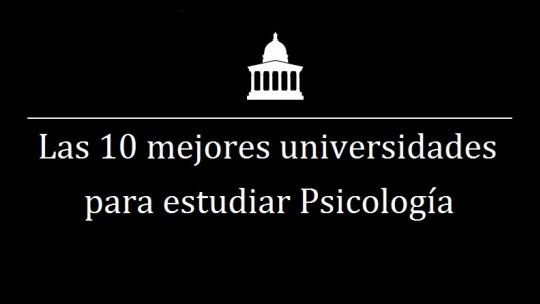
In recent years, An increase has been observed in the number of students enrolled in distance learning universities
To illustrate the example, the UNED (National University of Distance Education) has gone from 126,500 students enrolled in degrees in the 2012/2013 academic year, to 150,000 in the 2016/2017 academic year, with the Degree in Psychology being the most taken degree. However, the dropout rate is very high: only 2 out of every 10 enrolled will obtain the precious title.
Among the many reasons that can lead to giving up, two stand out:
Is it a good idea to study Psychology at UNED?
At this moment it is worth asking, what motivates the remaining 20% to finally win the scholarship and university degree? In this article we have proposed to offer you ten keys that can help you decide to study Psychology online (…or not).
1. Passion for the field of Psychology
Feeling passionate about learning about an area of knowledge constitutes in itself a very powerful source of motivation Psychology would classify this passion within intrinsic motivation since the mere fact of studying that area produces an activation of our behavior that leads us to seek learning without the need for external stimuli. Simply: the pleasure of knowing.
2. Desire to improve
Whoever sets out to obtain a distance degree establishes a clear goal, the achievement of which can confront us with challenges, difficulties and fears, and which will have its best and worst moments. But not only are challenges overcome, but we also carry out improvement on a personal level Along this path, skills, competencies and attitudes flourish and develop that direct you to the set objective, which are also strengthened by the knowledge about motivation, learning, behavior… that the study of Psychology confers.
3. Personal satisfaction
We can define it as well-being, a feeling of pleasure when getting something you want or need Throughout the study of a career such as Psychology or any other, we must not forget that not only does it give great satisfaction to finish it completely, but, by achieving short and medium-term goals, you get closer to that final objective. .
Doing good work, passing exams, seeing another academic year completed, or being able to apply and explain content from Psychology in your daily life, involves overcoming small challenges that generate satisfaction in themselves.
4. Building resilience
Resilience is defined as the ability of human beings to adapt positively to adverse situations, being able to overcome them. Studying remotely has benefits, but also some difficult moments such as not passing exams, being forced to adapt the usual way of studying to that of non-face-to-face teaching or having miscalculated the study time of a subject that is more difficult for you. than expected.
Experiencing these situations can cause some discomfort, but, at the same time, it promotes reflection and implementation of strategies to avoid them or cope with them in the future. While studying Psychology, studying Albert Bandura’s “Self-Efficacy Theory” helps you become much more aware of it.
5. Personal, social and professional assessment
Taking the step of studying this (or another) degree remotely/online, why not say it, is quite a challenge You know it, your friends and family know it, and whoever will hire you in the future will take it into account. Overcoming the day to day, year after academic year, reports a feeling of self-efficacy, which, in your environment, is also perceived.
On the other hand, at a professional level, the fact of obtaining regulated training through this modality is valued as it reflects perseverance, determination and responsibility, among many others, highly valued skills in the workplace. On the other hand, the study habit acquired by distance learning students is an essential tool for those considering taking competitive exams.
6. Contact with classmates and teachers
The contact is less than in a university with face-to-face teaching, however, since Psychology is one of the most studied courses in the distance modality, There is a great collaboration of other students through official and unofficial forums blogs and social networks to share content, notes, ideas, study methods, opinions… perceiving a very enriching climate of mutual help and understanding between classmates and teachers.
On the other hand, if some hours are taught in person or online via streaming, these are very motivating and allow you to meet other people with whom you can share the experience and support each other during the study.
7. Development of critical sense
Working individually on the content encourages reflection about it and, why not, the debate with fellow forum members and autonomous research, leading us to draw conclusions that, perhaps, do not appear in the content to be studied.
On the other hand, through what is known as Continuous Evaluation (modality of the UNED Degree in Psychology), students carry out work that promotes reflection, allows the application of tests and/or knowledge and the verification of results in real or fictitious situations. , promoting practice and first-person experience of what has been studied.
8. Development of organizational capacity and time management
Let’s use an assumption: “September. You have enrolled in four subjects for the first semester, each of which is made up of between 10 and 16 topics. For each subject you can submit a practical work proposed by the teachers (of different modalities depending on the subject, such as the analysis of a book or a short investigation with 20 participants) whose delivery dates are different (normally for Christmas) and the exams are set. for the last week of January and the second of February.”
The first year it is common not to have that awareness that no one but oneself can structure such planning but, finally, calendar in hand, the distance student learns to organize his or her time taking into account factors such as the difficulty of the subject or the time dedicated to work.
9. Commitment and perseverance
Like any long-term project, commitment and perseverance are essential values to maintain the action over time that leads us to win the title. They thus influence the motivation to study daily, attend classes, pay attention to assignments and finally reach the final evaluations with homework done.
The Degree in Psychology is structured in four academic years, a time that may be extended depending on personal needs. In that case, and specifically at UNED, there is no time limit imposed to complete the Degree, which is an advantage to highlight.
10. Increased curiosity
Psychology is a science that studies and analyzes the behavior and mental processes of individuals and groups in different situations, and at the same time it explains a wide variety of facts, there are also many others that have not yet been explained, such as intuition. or deja vu.
This fact, linked to the passion for the field of study, autonomous work, critical sense and the possibility of debating with classmates and teachers, highlights the tenth of the motivations to study a Degree in Psychology: the development of a mind hungry for knowledge, eager to explain the multiple phenomena that surround us.
And you, Would you dare to study Psychology remotely or online?








